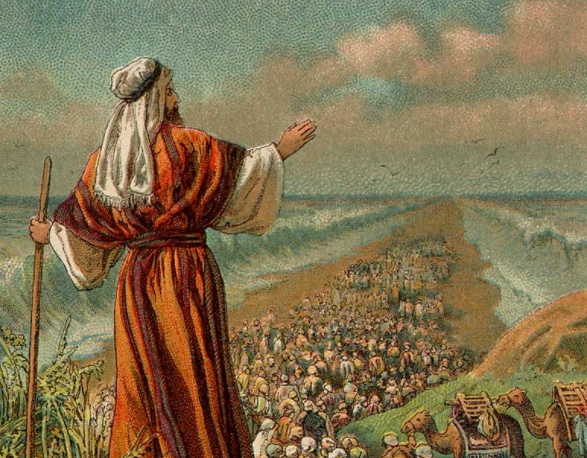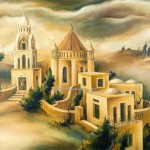
Pesach: liberation from physical and spiritual slavery.
 Of course we all know what Pesah means: “to pass over” (cf Ex: 12,13: I will see the blood and I will pass over you’’. In fact, Pesah celebrates several “pass overs”… several “passages”. In the Pesah Haggada, the central Midrash on Dt 26:5-8 is introduced by two Biblical references: the first one is Dt. 6:21: We were Pharaoh’s slaves in Egypt but the Lord brought us out of Egypt with a mighty hand; the second one paraphrases Jos. 24:2: Our forefathers were serving idols and the Lord brought us near to His service. The Sages explain how both are important and complementary. One mentions the liberation from physical slavery, the other from spiritual slavery. And according to them, the second one is more important because we are constantly challenged by all kinds of idols. For both of them the Mishna speaks about “passing from shame to praise”, insisting on the fact that the liberation must not make us forget the former state whence we have come. We can be freed only if we acknowledge that we are slaves. That is why, they say, we eat the “matza” (unleavened bread, a sign of freedom), together with the “maror” (bitter herbs, a sign of slavery). Eating them together makes us assimilate the passage, making it part of our Being.
Of course we all know what Pesah means: “to pass over” (cf Ex: 12,13: I will see the blood and I will pass over you’’. In fact, Pesah celebrates several “pass overs”… several “passages”. In the Pesah Haggada, the central Midrash on Dt 26:5-8 is introduced by two Biblical references: the first one is Dt. 6:21: We were Pharaoh’s slaves in Egypt but the Lord brought us out of Egypt with a mighty hand; the second one paraphrases Jos. 24:2: Our forefathers were serving idols and the Lord brought us near to His service. The Sages explain how both are important and complementary. One mentions the liberation from physical slavery, the other from spiritual slavery. And according to them, the second one is more important because we are constantly challenged by all kinds of idols. For both of them the Mishna speaks about “passing from shame to praise”, insisting on the fact that the liberation must not make us forget the former state whence we have come. We can be freed only if we acknowledge that we are slaves. That is why, they say, we eat the “matza” (unleavened bread, a sign of freedom), together with the “maror” (bitter herbs, a sign of slavery). Eating them together makes us assimilate the passage, making it part of our Being.
Toward the end of the “Haggada”, the introduction to the Hallel (Ps 113-118) recapitulates the different “passing overs”: From darkness to light, from slavery to freedom, from servitude to service, from sorrow to joy …
And each Psalm of the Hallel also expresses one “passage”. It begins with Psalm 113: Halleluia, Praise servants of the Lord, praise the Name the Lord. In Hebrew, “Eved” can mean at the same time slave or servant. If we are “eved” of a tyrant, we are slaves, and if we are “eved” of the Lord, we are servants, free. And the Jewish tradition interprets: We were slaves of the Pharaoh, and when the Lord took us out of Egypt we became servants of the Lord. This is why we can say “Halleluia. According to them,” Halleluia” is the Highest praise of God because it combines the invitation to praise: “Hallelu”, praise, and the Name of the Lord, “Ya” (abbreviation of the unpronounceable Name of God ). Only a free heart can say” Halleluia”!
Then Psalm 114 sings the passage of the Red Sea. Psalm 115 mentions the liberation from idolatry, Psalm 116, the passage from anguish to praise. Psalm 117 invites all the nations to join the praise, and Psalm 118 culminates with the passage from death to life.
We can easily join this praise as Christians when we sing our Paschal Halleluia. With Christ we passed from death to life. We assimilate His “pass over” when we eat his body and drink his blood, and we sing Halleluia as a song of victory of life over death for ever.
Christ, our “Pesah”, has been immolated; therefore let us celebrate the Festival, not with the old yeast of malice and evil, but with the unleavened bread of sincerity and truth. ( I Co: 5, 8)
by Sr. Anne-Catherine Avril, NDS






